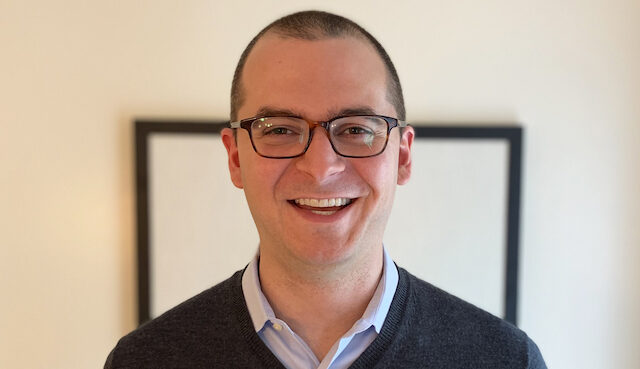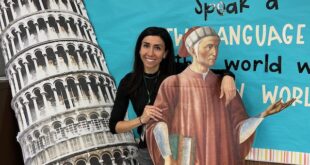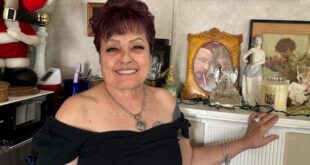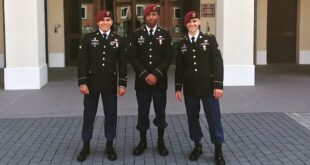After beating serious health challenges that hampered his athletic and corporate careers, Chris Bordoni celebrates resilience through a special podcast.
Talented teens and young adults tend to view themselves as invincible. Even when they suffer a major setback or two, they often emerge humbler but still immensely confident. But what happens to a star athlete and corporate wunderkind who gets sidelined not once, but four times by serious health issues?
In the case of Chris Bordoni, the answer defies easy analysis or explanation — especially since his last health scare was the worst: Stage 3B testicular cancer. Where others might have felt bitter or cheated, this former All-American swimmer and hot-prospect consultant emerged from it all with two gifts: peerless resilience and a sense of wonder that drove him to seek out and share the stories of others who have knit their personal scars into a constellation of stars.
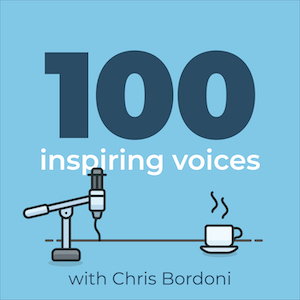 Bordoni’s “100 Inspiring Voices” podcast revolves around questions that run the gamut from “Why do some people grow stronger when faced with adversity?” to “How are some organizations and communities able to thrive after devastating setbacks?” The podcast project, which will take him two years to complete, has definitely caught on. To date, it has more than 3,000 downloads.
Bordoni’s “100 Inspiring Voices” podcast revolves around questions that run the gamut from “Why do some people grow stronger when faced with adversity?” to “How are some organizations and communities able to thrive after devastating setbacks?” The podcast project, which will take him two years to complete, has definitely caught on. To date, it has more than 3,000 downloads.
Lou&A sat down with Bordoni to learn more about his story, his triumphs and the inspiration he gleaned from his parents, including an Italian father with health issues of his own.
Lou&A: Tell us about your family roots.
Chris Bordoni: My father is 100 percent Italian. His grandparents emigrated from Calabria and Rome in the early 1900s and eventually settled in upstate New York. They ran a grocery store, a shoe repair shop, worked in a manufacturing plant — whatever you could do to support your family. My mother’s lineage is quite different. Her English ancestors came to America on the Mayflower and spent generations in New England. She’s mostly English with some Irish and German as well.
Lou&A: By the time you were 30, you’d spent roughly half of your life fighting one health challenge or another, yet you never gave up. How do you explain that?
Bordoni: I’ve had some amazing role models in my life. My father was born in 1953 and contracted polio as a small child. As a result of the disease, he lost the use of his left arm. His mother — my grandmother — also contracted polio and spent the rest of her life in a wheelchair.
But to [my father’s] great and enduring credit, he wasn’t interested in being told what he couldn’t do. He and his sisters were the first in their family to go to college, and my father went on to law school and had a successful career as a lawyer in Syracuse. As a child, I saw my dad tying his shoes with one hand, playing golf on the weekends and teaching me how to hit a baseball. Try tying your shoes with one hand; these are incredibly difficult things to do.
Lou&A: You were a star swimmer who succumbed to shoulder injuries and surgery. You landed two incredible jobs in the corporate world as a consultant and had to leave them both because of back injuries that left you barely able to walk. Then came the cancer. Did you ever feel like giving up?
Bordoni: In the worst moments, I was just trying to survive. As humans, we’re pretty good at getting through the worst of things, and I was fortunate to have really good care. I also remember thinking “animals don’t complain” over and over. I don’t know why that occurred to me — it’s a strange yet true thought — but it inspired me to move beyond suffering.
Lou&A: In that spirit, you went on to get an MBA at the University of Chicago, and you run your own successful consultancy today. How do you explain your own resilience in getting to the other side?
Bordoni: In terms of hope, I have a deep sense of knowing and purpose. Even during the worst days of treatment, I knew that my work wasn’t done here. I never believed that I would die because I knew that I had more work to do. That was really powerful.
The other side of this is my faith. I was raised Catholic but never really integrated the religion into my life. No judgment; it just didn’t speak to me. But I am a very spiritual person. I feel supported by a higher power, and that gives me comfort and strength. I’m not sure what box you could put me in, but my faith is a big part of my life.
Lou&A: Though you have no experience as an audio engineer, interviewer or on-air host, you’ve started a podcast that sounds amazingly professional. Where would you say you are on the learning curve at this point?
Bordoni: There’s definitely a learning curve, and I’m still on it. My goal was for the episodes to be high enough quality that I didn’t embarrass myself or my guests, but not so high that I never actually launched. I think I’ve done a good job of striking that balance.
Lou&A: On your podcast, you’re a generous host in letting your guests take the spotlight, yet your story is worth a three-part series!
Bordoni: I’m getting better at sharing more of my story and my thoughts in the interviews. The No. 1 piece of feedback I get is that people want to hear from me more. That’s really hard to do when you’re asking amazing people to share their story.
Lou&A: Resilience is a key to the work you do and the life you’ve lived. What have you discovered about this quality?
Bordoni: What I’ve learned from my work, my research and my experiences is that we all have resilience inside of us. None of us start from zero. That’s the good news. But the bad news — or the news that most people don’t want to hear — is that you become more resilient by building it slowly over time.
I think I’m a good example of that. I’ve been able to make the most of some unexpected setbacks because I had a lot of resources to draw upon, such as family and faith, and because I’ve invested in slowly building up the mindsets, beliefs and practices that make people more resilient, inadvertently at first and now more purposefully.
Lou&A: You’re giving listeners a lot through this podcast, and yet it sounds like you’re getting a lot out of it as well.
Bordoni: These are deeply humbling conversations that remind me every week of the commitments I’ve made to myself and the type of life that I want to live. That’s an amazing forcing mechanism. Like everyone, I get ungrounded or lose my center. Talking to someone who is filled with optimism and hope after losing their legs, surviving the Holocaust or finding out that their child is ill will bring you back in a hurry. Without a doubt, being able to close my eyes and truly listen to a beautiful human being for an hour is one of the greatest privileges of my life.
To learn more about Chris Bordoni and the podcast “100 Inspiring Voices,” click here.
The above appears in the February 2021 issue of the print version of Fra Noi. Our gorgeous, monthly magazine contains a veritable feast of news and views, profiles and features, entertainment and culture. To subscribe, click here.
 Fra Noi Embrace Your Inner Italian
Fra Noi Embrace Your Inner Italian


